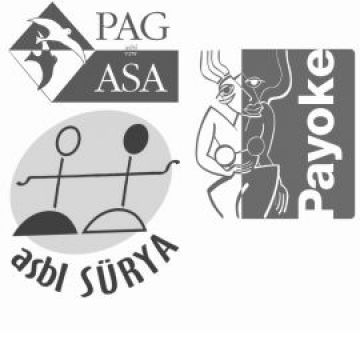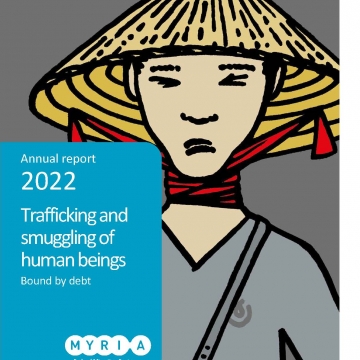Shelters for victims
Myria oversees the group of three specialized reception centres for victims of human trafficking: Payoke (Anvers), PAG-ASA (Brussels) and Sürya (Liège). We organize regular consultation meetings and, if necessary, we ask the relevant authorities to intervene in finding a solution to problems that arise.
In Belgium, the federal government, communities, and regions subsidize three centres that specialize in the reception of human trafficking victims. These are Pag-Asa in Brussels, Sürya in Liège, and Payoke in Anvers.
Belgium has opted for a multi-disciplinary approach as part of its efforts to combat human trafficking. In addition to suppressing the perpetrators, special attention is also given to victims. The majority of victims are discovered by police officers during checks, who send them on to specialized centres. They are also discovered by social services, prosecution services, work auditors, and the Immigration Office. Members of public can contact the relevant centres through these services.
Shelters and Out-Patient Support
Often the victim has nowhere to sleep other than the place where they were exploited, or another place where their safety is at risk. This is why centres linked to shelters have secret addresses where the victims can stay for a limited period. They are then supported as out-patients. If they do not need to stay in a shelter, they automatically receive support as an out-patient.
Support Plan
Shelters and the multifaceted teams that run them (educators, social workers, criminologists…) provide a three-pronged plan:
1. Psychological and Medical Aid
The goal is to help the victims to overcome their past experiences and the trauma they have suffered, to enable them to regain control of their current lives as best they can, and to help them develop realistic plans for the future. This requires the victim to enroll in language classes, vocational training, or to look for a job.
2. Administrative Support
This support principally consists of requesting documents detailing their status as a human trafficking victim: expulsion order (45 days leeway), certificate of registration (3 months, with the possibility of extension), enrolment certificate for the foreign register (6 months, with the possibility of extension) and regularization. If the victim wishes to return to their country of origin, the centre will contact the International Organization for Migration (IOM) to arrange their voluntary return. If necessary, family members present or local organizations are contacted.
3. Legal Assistance
The centres’ aim is to ensure the victim’s rights and interests are protected during the legal procedure that determines the details of their trafficking, meanwhile informing them and offering them help from a lawyer. This equips them to make an informed decision on whether or not to lodge a complaint. Shelters can also make a complaint, either in their own name or on behalf of the victim.
Minors
These centres are not structurally designed for minors. As a result, minors are registered with centres for foreign unaccompanied minors/victims of trafficking such as Esperanto in Wallonia, Juna in Flanders, or Minor N’Dako in Brussels. These centres ensure that the minors are accomodated and given legal and administrative support. Since 2002, they have put in place a “mentor” system, which assigns a mentor to each unaccompanied minor. The mentor is responsible for protecting the minor and holding their best interests at heart.

 Publication
Publication
Universal Periodic Review: Parallel report
Parallel report of Myria, Unia and the Combat Poverty, Insecurity and Social Exclusion Service, on the 52nd session of the Universal Periodic Review.
 Publication
Publication
2024 Annual report Trafficking and smuggling of human beings
This annual report, entitled ‘Latin American sex work: a high-risk carousel’, particularly draws attention to the phenomenon of Latin American sex work and calls for the fight against trafficking to be adapted to the new realities of the digital world. These realities are leading to the creation of new, subtle forms of exploitation that require properly adapted investigative resources. Myria is also calling for stronger international collaboration and awareness-raising among the players concerned
_360_360_s_c1.png) Publication
Publication
Gaza Strip: Belgian assistance, evacuations and visa applications
Myria continues to receive reports from Palestinians and Belgians who are deeply concerned about the fate of their relatives trapped in extremely dangerous conditions in Gaza.
 Publication
Publication
2023 Annual report trafficking and smuggling of human beings
Myria is publishing the English version of its 2023 evaluation report, entitled ‘A chain of responsibilities’. With a focus on human trafficking for the purpose of labour exploitation, Myria is calling for more proactive checks and a thorough chain approach.
_360_360_s_c1.png) Publication
Publication
Human rights also apply to single men seeking asylum
8 human rights organisations condemn the decision to temporarily exclude single men from the right to reception within the framework of the asylum procedure.
 Publication
Publication
2022 Annual report trafficking and smuggling of human beings
Myria, the independent national rapporteur on trafficking in human beings, is publishing its 2022 public and independent annual report in English entitled Bound by debt.
